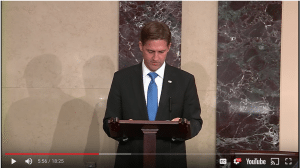Justin Taylor's Blog, page 30
October 12, 2018
A Conversation with a Cigar-Smoking Reformed Baptist on Confessionalism, Calvinism, and Doubt

The conversation above is from the new video / podcast, SelfWire, hosted by Paul Maxwell.
Joe is always worth listening to, and I commend to you their conversation.
October 11, 2018
A Short Documentary on Albert Mohler

This is a wonderful documentary on the amazing story of how R. Albert Mohler Jr. assumed the presidency of The Southern Baptist Theological Seminary in Louisville, Kentucky, 25 years ago this year, and returned the school to theological fidelity—one of the most significant events in 20th century church history.
John Frame’s 9-Point Checklist for Evaluating Theological Writings

Theologian John Frame sets forth the criteria he uses—and tries to avoid—when evaluating theological writings.
1. Scripturality
Are the ideas teachings of Scripture?
Are they at least consistent with Scripture?
This is, of course, the chief criterion.
2. Truth
Even if an idea is not found in Scripture, it may be true—for example, a theory about the influence of Bultmann or Pannenberg.
3. Cogency
Is the author’s case adequately argued?
Are his premises true, his arguments valid?
4. Edification
Is it spiritually helpful?
Harmful?
Hard to say?
5. Godliness
Does the text exhibit the fruit of the Spirit, or is it blasphemous, gossipy, slanderous, unkind, and so forth?
6. Importance
Is the idea important?
Trivial?
Somewhere in between?
Important for some but not for others?
7. Clarity
Are the key terms well defined, at least implicitly?
Is the formal structure intelligible, well thought out?
Are the author’s positions clear?
Does he formulate well the issues to be addressed and distinguish them from one another?
8. Profundity
Does the text wrestle with difficult, or only with easy, questions? . . .
Does it get to the heart of a matter?
Does it note subtle distinctions and nuances that other writers miss?
9. Form and Style
Is it appropriate to the subject matter?
Does it show creativity?
[Frame also lists what he considers to be unsound criteria for evaluating theological writings. In other words, these are the sort of things not to use.]
Emphasis
In this kind of criticism, one theologian attacks another for having an improper “emphasis.”
But there is no such thing as a single normative emphasis.
An emphasis becomes a problem only when it leads to other sorts of problems. . . .
Comparability
Here a work is criticized because it resembles another work that is poorly regarded.
Such resemblance, however, is never sufficient ground for criticism.
The strengths and weaknesses of each work must be evaluated individually.
Terminology
Criticizing the terminology of a work—its metaphors, motifs, and definitions—is never sound unless the terminology causes some of the problems listed above in criteria 1-9.
The terminology itself is never the problem.
This sort of criticism falls under our condemnation of “word-level,” rather than “sentence-level,” criticism.
Adapted from John M. Frame, “Appendix E: Evaluating Theological Writings,” in Doctrine of the Knowledge of God (Phillipsburg, NJ: P&R, 1987), 369–70. Used with permission.
October 8, 2018
Is Tim Keller a “Cultural Marxist”?

If he is not a Marxist, it does not take a postgraduate qualification in logic to deduce that he can scarcely be a cultural Marxist.
Even so, let’s indulge the critics and ask this question: Does Tim Keller’s view of the culture have parallels with the Gramscian tradition? Yes, it does in that he is a cultural transformationalist who believes that the world can be dramatically benefited by—schools, universities etc. So do the Acton Institute, Marvin Olasky and the team at World Magazine and numerous friends and colleagues in First Things circles. I hardly think they would appreciate being given the label of cultural Marxists. To want to change the culture is a desire of anyone who is dissatisfied with the status quo, not a necessary sign of commitment to dialectical materialism or a diabolical hatred of free markets.
Let me be clear—while respecting him as a brother in Christ, I am not an acolyte of Rev. Keller. I disagree at points with both his theology and philosophy of ministry. Nor do I share his love of the city. For me, cities are a necessary evil whose sole purpose is to provide country boys like me somewhere to go to the theatre once in a while. And I am definitely not an optimistic transformationalist as he is—trust me, things are going to get worse before, well, they get even worse than that.
But he is no cultural Marxist, and to call him such is to reveal not the politics of the good doctor but the ignorance of the troll.
It is to indulge in the spirit of this age, which eschews thoughtful argument about difficult issues for moronic and often malicious soundbites.
It is not a helpful way of locating him in current debates in order to further the discussion, but rather a cheap way of pre-emptively delegitimizing him and his opinions.
It is an unwarranted slur on his character, for we all know that cultural Marxism is not intended as a morally neutral term.
And—I almost forgot—it is to break the Ninth Commandment about a Christian brother. And that’s a sin—not so much a sin against Tim Keller as against the God he serves.
You can read the whole thing here.
(You can also stop clicking on links that commit slander.)
October 7, 2018
3 Reasons Charismatics Are Wrong about New Testament Prophecy

In his new commentary on 1 Corinthians, Tom Schreiner argues that Paul uses the word prophecy to reference “communicating revelation from God in a spontaneous utterance.”
He explains that Wayne Grudem “argues that New Testament prophecy is fallible, unlike Old Testament prophecy, so it may be mixed with error (errors may crop up in the transmission of what God revealed).”
Grudem believes New Testament prophecy may err for three reasons
(1) their prophecies are judged (1 Cor. 14:29; 1 Thess. 5:20–21);
(2) some prophecies are disobeyed (Acts 21:4); and
(3) Agabus’s prophecy was in error (Acts 21:11), in that the Jews did not bind Paul and hand him over to the Romans.
Schreiner concludes:
Grudem’s reading is intriguing but fails to convince;
it is more plausible to say that New Testament prophecy like Old Testament prophecy is infallible . . .
He offers three reasons for this conclusion:
First, the judging of prophecies does not indicate that prophets could err, for in the Old Testament the only way to determine whether someone was a true prophet was by assessing prophecies. If the prophecies were mistaken, the person was not a true prophet (see Deut. 18:21–22; 1 Sam. 3:19–20).
Second, Agabus was not mistaken in Acts 21:11, since when Paul recounts the story of his arrest in Acts 28:17 he appeals to the very word Agabus used (paradidomi) to describe Paul being handed over to the Romans.
We have further evidence that Agabus spoke as a prophet of the Lord, like the Old Testament prophets.
He used prophetic symbolism in binding his own hands and feet, imitating the kind of prophetic symbolism we find in the Old Testament (e.g., Isa. 20:1–6; Jer. 13:1–11; Ezek. 4:1–5:17). In addition, the words of Ababus reflect a prophetic formula, “The Holy Spirit says” (Acts 21:11). The word tade (lit. “these things”) is used over and over in the Old Testament to introduce the word of the Lord (cf. also Rev. 2:1, 8, 12, 18; 3:1, 7, 14).
Third, in Acts 21:4 the prophecy was Spirit-inspired and accurate (Paul would suffer), but the inference drawn from the prophecy (Paul should not go to Jerusalem) is mistaken.
For these reasons, Schreiner concludes:
[T]he prophetic gift in the New Testament is of the same nature as the gift in the Old Testament.
God communicates, typically spontaneously, revelations by his prophets which are authoritative and completely true.
Thomas R. Schreiner, 1 Corinthians, Tyndale New Testament Commentaries (Downers Grove, IL: IVP Academic; London: Inter-Varsity Press, 2018), 259–61 (emphasis added above).
The New Testament does not explicitly teach that the miraculous sign-gifts cease; rather, it is an inference made by cessationists. Likewise, the New Testament does not explicitly teach that the nature of prophecy changes from one testament to another; again, it is an inference made by continuationists.
When discussing debates like this, we often neglect the question of the “burden of proof.” John Frame once commented on this with regard to the paedbaptist vs. credobaptist debate, pointing out that according to paedobaptists, “We can assume continuity with the Old Testament principle of administering the sign of the covenant to children, unless the New Testament evidence directs us otherwise.” As a Baptist, I agree with him—Baptists hold the burden of proof here. (I just happen to think the burden can be met.)
Similarly, it seems to me that continuationists bear the burden of proof to demonstrate that prophecy changes from one testament to the other. Grudem seeks to meet the burden, and Schreiner seeks to show why their case is not convincing.
October 5, 2018
A Poem about the New Heavens and New Earth

From John Piper’s poem “Glorified” (written in 1985) on what every Christian longs to see someday.
And then the Lord
Wiped every tear away and turned
To see his bride. Her heart had yearned
Four thousand years for this: His face
Shone like the sun, and every trace
Of wrath was gone. And in her bliss
She heard the Master say, “Watch this:
Come forth all goodness from the ground,
Come forth and let the earth redound
With joy.” And as he spoke, the throne
Of God came down to earth and shone
Like golden crystal full of light,
And banished once for all the night.
And from the throne a stream began
To flow and laugh, and as it ran,
It made a river and a lake,
And everywhere it flowed a wake
Of grass broke on the banks and spread
Like resurrection from the dead.
And in the twinkling of an eye
The saints descended from the sky.
And as I knelt beside the brook
To drink eternal life, I took
A glance across the golden grass,
And saw my dog, old Blackie, fast
As she could come. She leaped the stream—
Almost—and what a happy gleam
Was in her eye.
I knelt to drink,
And knew that I was on the brink
Of endless joy. And everywhere
I turned I saw a wonder there.
A big man running on the lawn:
That’s old John Younge with both legs on.
And there’s old Beryl, and Arnold too,
Still holding hands beneath the blue
And crystal sky: No stoop, they stand
Erect. No tremor in their hand.
The blind can see a bird on wing,
The dumb can lift his voice and sing.
The diabetic eats at will,
The coronary runs uphill.
The lame can walk, the deaf can hear,
The cancer-ridden bone is clear.
Arthritic joints are lithe and free,
And every pain has ceased to be.
And every sorrow deep within,
And every trace of lingering sin
Is gone. And all that’s left is joy,
And endless ages to employ
The mind and heart to understand
And love the sovereign Lord who planned
That it should take eternity
To lavish all his grace on me.
O God of wonder, God of might,
Grant us some elevated sight,
Of endless days. And let us see
The joy of what is yet to be.
And may your future make us free,
And guard us by the hope that we,
Within the light of candle three,
Your glory will forever see.
You can read the whole thing here (which also includes audio of Piper reading it).
October 4, 2018
One of the Best Speeches You Will Ever Hear from the Senate Floor

Senator Ben Sasse of Nebraska, a member of the Senate Judiciary Committee, delivered an outstanding 18-minute speech on the Senate floor last night, addressing the incredible pain and horror of sexual assault, lamenting the false binary choice being offered to Americans, and chastising our tribalistic “addiction to the circus.”
Every single line is worth noting.
The 18-minute video is above, and the complete transcript is below.
Mr. President:
I rise to say in public what I’ve been discussing with many individual Nebraskans over the last 17 days—about the MeToo movement . . . the important MeToo movement, about our nation’s accelerating descent into tribalism, and about our continuing decline of the Senate as a deliberative body.
Or, as a Nebraska woman put it more bluntly a couple nights ago: “What the hell is happening to my country?!”
One part of the answer to her urgent question is that the Senate is being swallowed whole by 24/7 cable news. And that inclination, that temptation, probably just can’t be reconciled with being a great deliberative body. Doing reality-TV and wrestling with big, hard complicated long-term problems are just fundamentally different things.
I am not here tonight to talk about the Supreme Court confirmation votes that we will probably be taking this weekend. I am here to talk about the nasty process we’ve been navigating over the past 86 days—and about the false choices some people are claiming stand before us, and about where we in the Senate will go next week, next month, and next year after that vote.
I’m not here to talk about how fundamentally broken the Senate Judiciary Committee is—or about how absurd it is to think that the problems in our committees are going to be solved by preening and grandstanding Senators looking for soundbites—though both of those things are obviously true.
No, I’m here to talk about the false choice that is being repeated hour after hour after hour on television—that this confirmation vote about one vacant seat on the Supreme Court. In that vote, we are going to be making a giant binary choice about the much broader issue of whether we do or don’t care about women.
That is simply not true. That is not what we are doing this weekend.
Fortunately, many Nebraskans the last two weekends when I’ve been home have been much more nuanced than the kind of screaming that we hear on battling cable news channels. A Supreme Court confirmation vote isn’t a grand choice about whether we love our daughters or whether we trust our sons. That is not the choice before us. This is a consent decision about one person for one seat.
Again, I’m not here to talk tonight about the particular vote. There’s lots of lobbying going on around this body right now—I’m not here to talk about that particular vote. But I will say that I’ve spent more than 150 hours, at this point, reviewing documents, and in hearings, and consulting investigators and experts related to this confirmation. Moreover, I’ll also say that although I’ve said many complimentary things about Judge Brett Kavanaugh and his distinguished record of twelve years of service on the D.C. Circuit Court—I will say that I urged the President (back in June and early July) to make a different choice before he announced this nomination). I urged him to nominate a different individual. I urged the President to nominate a woman.
Part of my argument then was that the very important MeToo movement was also very new—and that this Senate is not at all well prepared to handle potential allegations of sexual harassment and assault that might have come forward. This is absent knowing a particular nominee. Let me be clear: There is some academic literature that suggests that very few allegations of sexual assault in the broader culture are fabricated—or stated conversely, the hefty majority of allegations of sexual assault in our broader culture are probably true. But in politics, in this city—a place filled with politicians who constantly believe that the end justifies the means—that situation might well have been different, I argued in June. So in the interest of cautious prudence, I urged a different path than the one that was chosen.
But, so what? Once the decision was made, once the President made his nomination, that meant that the work the Senate needed to do was to evaluate the specific evidence and claims about the specific individual that was on the floor before us.
But we’re being told now that our vote isn’t about a specific individual, a specific seat, or specific evidence. But rather, we’re being told that choice before us in this confirmation is a much broader choice about whether we do or don’t care about women.
If you turn on cable news or if you open up social media—and I highly recommend against both of those things in times like this (For the last two and a half weeks, I have stayed clear almost entirely of those two ugly places and it has been good for my soul)—but what you hear if you turn on cable or if you look at social media is:
“Pick a side!”
It is good versus evil.
Everything is immediate.
Everything is certain.
There’s no doubt; there is no gray.
There are only tribes of Hatfields and McCoys; Israelis and Palestinians.
A world of generational hatred without end—no listening; no understanding; no empathy; and no possibility that perhaps, just maybe, in a broken world, violence, pain, and shame are all too real.
And perhaps trying to make angels and devils out of your fellow countrymen and women is not the most useful way for us to try to make sense of the world. Everything might not be black-and-white simple.
We regularly seem in this body and in the politicized culture that we’re trying to serve on cable news we seem to lack any awareness of the possibility, that maybe—just maybe—constant-instant certainty about political battle lines might not be a good way to go forward. We might be undermining rather than building a healthier world for our kids.
Well, I don’t believe that this is what most Americans want.
I don’t believe most Americans are political addicts.
I don’t believe most Americans trust us in this institution.
I don’t believe that most Americans want our political class to be our leaders right now.
I don’t believe that most Americans want to see each and every question, each and every sphere of life, each and every institution across the land to be politicized.
I think most Americans are a lot more like my wife—who called me last week from Nebraska, sobbing, after both opening statements on Thursday.
What we saw and heard during last Thursday’s eight grotesquely public hours was two different families hurting badly. Two families, the Ford family and the Kavanaugh family—both of them homes with children—that have been the recipients of constant death threats. And for what? For one seat on the Supreme court? We know that this isn’t about that when people are threatening death. This is about tribe. One of these two families can’t let their girls go out alone now; the other family has had to move out of their home. In both northern California and suburban Maryland, there are extra folks being hired in the important work of protection and security details but a part of our economy that we don’t want to grow and that is indisputably growing in our time. This isn’t right.
We saw people having to grapple with the brokenness, and the sinfulness, of a fallen world—but they were not just grappling with it. They were grappling with the nastiness East of Eden real time, on television as a kind of polititainment art.
No one really thinks that our body politic is going to get any healthier by giving more oxygen to the one-man clown-show that is Michael Avennati.
But you know what? Not being down with the Circus is not the same thing as being indifferent to the complexities of the MeToo moment.
I believe that we have a widespread legacy of sexual assault in this country.
I believe we don’t have much of a shared sexual ethic right now—and we haven’t for quite some time—and I think horrible stuff has happened, and continues to happen.
I’ve wept with the victims of sexual assault, and I believe the advocacy groups’ data that between one-fifth and one-third of American women have been sexually assaulted at some point in their lives. And given that most women have many other important women in their lives—a mom, and a daughter, sisters, and a couple of close friends—it means that the overwhelming majority of American women have been deeply affected, deeply hurt, by the tragedy of sexual violence.
I have had two dear, dear friends who have been raped, and it is an act from the pit of hell.
People—men and women—are created in the image of God—imago Dei, as we say in Christianity. Sexuality is a deep and precious gift—it is an intimacy, it is a oneness—that is to be shared and given—never taken. Sex is big, not small—and you don’t get to decide it for someone else.
The MeToo movement is a complicated movement, but it has been a very good thing. Far too often, many girls and women have been told that they are meat. They’ve been told this in word and in deed that they are parts to be consumed—rather than God’s children to be cherished and respected and partnered with.
Caitlin Flanagan, of The Atlantic—one of the most profound writers on sexuality in our time—wrote recently about a horrible experience she endured during her senior year of high school on Long Island. She was the victim of an attempted date rape. And she had contemplated suicide in the aftermath. She struggled in school and she doubted her worth and value.
After she struggled against this boy trying to violently force himself on her for many scary minutes, he finally gave up–and just decided to re-start their car. They drove away from that deserted beach in silence.
Listen to her words. She writes:
I told no one. In my mind, this was not an example of male aggression used against a girl to extract sex from her. In my mind, this was an example of how undesirable I was. This was the proof that I was not the kind of girl you took to parties. I was not the kind of girl you wanted to get to know. I was the kind of girl you took to a deserted parking lot and tried to make give you sex. Telling someone would not be revealing what he had done; it would be revealing how deserving I was of that kind of treatment.
Hear what’s she’s saying here. This precious young girl was hearing in her sexual assault that there must be something wrong with her—that she is the kind of girl worthy only of being groped—she’s not worth being taken to dinner or engaged in conversation as if she has a mind.
If that doesn’t make you cry, there’s something wrong with you.
A now-adult Ms. Flanagan continues:
My depression quickly escalated to a point where, if I’d been evaluated by a psychiatrist, I would probably have been institutionalized as a danger to myself. I had plans for how I was going to kill myself. I managed to make a few friends, who introduced me to acid, which was no help with the depression. I sat in classes in a blank state, except for English. (“To the girl about whom I will someday say, ‘I knew her when,’” my English teacher wrote in that yearbook, words that stunned me when I first read them, and that I’ve never forgotten.)”
What a blessing to have had this kind of teacher—someone who proclaimed to Flanagan her dignity and her worth. Who shouted meaning into her soul.
Our culture has been living through an epidemic of sexual assaults. And these attacks on girls’ worth—on women’s worth—need to be grappled with. They need a reckoning.
What we’re dealing with here is horrible physically.
But it’s more than that.
We are dealing with, we’re dealing with something that has a spiritual level as well.
My view is that the MeToo movement is going to might some mistakes, it’s going to have some excesses, but overall, it has been an important and a needed development. A whole lot of brave women have stepped forward and they’ve exposed their abusers—who have been some of the most powerful men in Hollywood and media and corporate America and elsewhere. These women did this at unthinkable professional and personal risk. They deserve our respect.
They also deserve not to have their progress co-opted by the cynics who run this town. Their stories are not fodder for fundraising emails. The MeToo movement doesn’t belong to the Left or to the Right; the MeToo movement belongs to the women who have found in it an inspiration to step forward and confront the people who hurt them.
I have two daughters and, God forbid, in the event that something ever happened to one of my daughters, I want them to feel like they can come forward knowing that their accusations will be taken seriously. That they wouldn’t be dismissed or vilified for speaking up. They wouldn’t be ashamed or blamed.
We all know that the President cannot lead us through this time.
We know that he is dispositionally unable to restrain his impulse to divide us.
His mockery of Dr. Ford last night in Mississippi was wrong—but it doesn’t really surprise anyone. It’s who he is.
Similarly, it was wrong last week when he said that “if the attack on Dr. Ford was as bad as she says, charges would have been immediately filed with local Law Enforcement Authorities.”
It was wrong when people insinuate that a woman bears blame for her sexual assault because she was drunk. This reinforces the stereotypes that have caused millions of women to bury their experiences of abuse and assault for decades. This kind of repugnant nonsense creates excuses for abusers. Just because a women drinks—or even drinks too much—does not make her body, or her sexuality, any less her own. And I don’t want anyone telling those poisonous lies to my daughters.
I also have a son. And in the event that, God forbid, he’s ever accused of a crime, I hope he is presumed innocent, and that he’s permitted to exercise his right to defend himself. I think there are a whole lot of parents out there who think the same thing. I don’t just “think” this—I know this—because I’ve been answering the phone in my office this week. I’ve taken the calls from Nebraska moms who say just this.
We want this not because of our politics. We want this because we believe that girls and boys (women and men)—daughters and sons—are created with dignity and worth.
This is not about choosing between believing our daughters and protecting our sons.That choice is false.
But you know what my constituents back in Nebraska told me this weekend they think this is now about? They think this is about us. They think its about all of us in this town being addicted to the circus. They don’t think very many of us are interested in truth. They think we’re interested in political instrumentality. They think we’re interested in exploiting differences and divisions in America because we’re addicted to short term power in a city that isn’t worthy of much respect.
In closing, let me read you one more note from another Nebraska woman this week:
I was angry at yesterday’s hearing [this came in last Friday actually], angry that something as important as a conversation about the victimization of a woman at the hands of a man became just another move in a game of partisan chess. But I was also deeply troubled. Troubled that the painful memories shared by Dr. Ford in that hearing, troubled by the painful memories it evoked in women across the country who have suffered sexual violence. Troubled by the fact that this violence comes at the hands of men. I’m deeply saddened by this violence committed at the hands of men. I just can’t comprehend it. I weep for our sons and for our daughters that it exists in our fallen world. And to those victims for whom yesterday’s hearing brought fresh pain, I am so sorry that a political circus opened these wounds anew. I’m sorry that this abomination of humanity was ever experienced at all.
She continues:
Senator, I want you to vote to confirm Brett Kavanaugh, but I also worry that the vote might be heard as a reflection on the validity on other women’s experiences. I worry that pundits are going to tell women that. I’m tired of women’s stories just being used for politicians’ ends. I’m tired of women being used and discarded. Women’s pain isn’t just supposed to be a political football.
She’s obviously right.
The MeToo movement doesn’t belong to politicians.
The MeToo movement has elevated our consciousness and our awareness of sexual assault and sexual violence against women. And we must not give back the important ground in this movement by authorizing this media circus to stand in for generations of stories and tragic pain. And no matter how much cable news screams this, it would be an egregious offense against the cause of women to call this one “up or down” a proxy for the validation and validity of claims of sexual violence.
We can do better than that and we must do better—if we’re actually going to care about women and if we’re going to serve our constituents in this body.
Thank you, Mr. President.
Why God’s Love Is Better than ‘Unconditional’

David Powlison’s essay, “God’s Love: Better Than Unconditional,” suggests that people who use the term often have good intentions, wanting to affirm four interrelated truths:
“Conditional love” is bad—unconditional is shorthand for the opposite of manipulation, demand, judgmentalism.
God’s love is patient—unconditional is shorthand for hanging on for the long haul, rather than bailing out when the going gets rough.
True love is God’s gift—unconditional is shorthand for unearned blessings, rather than legalism.
God receives you just as you are: sinful, suffering, confused—unconditional is shorthand for God’s invitation to rough, dirty, broken people.
These are true—and precious. But Powlison offers several responses. (I will only summarize and paraphrase here—the essay itself contains the arguments in full.)
First, Powlison argues that “there are more biblical and vivid ways to capture each of the four truths just stated.” “People currently employ a somewhat vague, abstract word—unconditional—when the Bible gives us more vivid and specific words, metaphors, and stories.”
Second, it’s not true that unmerited grace is strictly unconditional. Jesus Christ opened a way for us to experience the biblical love of God by fulfilling two conditions: a life of perfect obedience to the moral will of God, and a perfect substitutionary death on our behalf. Powlison writes: “Unconditional love? No, something much better. People who now use the word unconditional often communicate an acceptance neutered of this detailed, Christ-specific truth.”
Third, God’s love is more than conditional, for it is intended to change those who receive it. “Unconditional” often connotes “you’re okay.” But there is something wrong with you. The word “unconditional” may well express the welcome of God, but it does not well express the point of his welcome.
Fourth, “unconditional love” carries a load of cultural baggage, wedded to words like “tolerance, acceptance, affirmation, benign, okay,” and a philosophy that says love should not impose values, expectations, or beliefs on another. In fact, humanist psychology even has a term for it: “unconditional positive regard” (Carl Rogers).
Powlison says, “We can do better”:
Saying “God’s love is unconditional love” is a bit like saying “The sun’s light at high noon is a flashlight in a blackout.”
Come again?
A dim bulb sustains certain analogies to the sun.
Unconditional love does sustain certain analogies to God’s love.
But why not start with the blazing sun rather than the flashlight?
When you look closely, God’s love is very different from “unconditional positive regard,” the seedbed of contemporary notions of unconditional love.
God does not accept me just as I am;
He loves me despite how I am;
He loves me just as Jesus is;
He loves me enough to devote my life to renewing me in the image of Jesus.
This love is much, much, much better than unconditional! Perhaps we could call it “contraconditional” love.
Contrary to the conditions for knowing God’s blessing, He has blessed me because His Son fulfilled the conditions.
Contrary to my due, He loves me.
And now I can begin to change, not to earn love but because of love.
. . . You need something better than unconditional love.
You need the crown of thorns.
You need the touch of life to the dead son of the widow of Nain.
You need the promise to the repentant thief.
You need to know, “I will never leave you or forsake you.”
You need forgiveness.
You need a Vinedresser, a Shepherd, a Father, a Savior.
You need to become like the one who loves you.
You need the better love of Jesus.
You can read the whole thing here.
Why God’s Love Is Better than “Unconditional”

David Powlison’s essay, God’s Love: Better Than Unconditional, suggests that people who use the term often have good intentions, wanting to affirm four interrelated truths:
“Conditional love” is bad—unconditional is shorthand for the opposite of manipulation, demand, judgmentalism.
God’s love is patient—unconditional is shorthand for hanging on for the long haul, rather than bailing out when the going gets rough.
True love is God’s gift—unconditional is shorthand for unearned blessings, rather than legalism.
God receives you just as you are: sinful, suffering, confused—unconditional is shorthand for God’s invitation to rough, dirty, broken people.
These are true—and precious. But Powlison offers several responses. (I will only summarize and paraphrase here—the essay itself contains the arguments in full.)
First, Powlison argues that “there are more biblical and vivid ways to capture each of the four truths just stated.” “People currently employ a somewhat vague, abstract word—unconditional—when the Bible gives us more vivid and specific words, metaphors, and stories.”
Second, it’s not true that unmerited grace is strictly unconditional. Jesus Christ opened a way for us to experience the biblical love of God by fulfilling two conditions: a life of perfect obedience to the moral will of God, and a perfect substitutionary death on our behalf. Powlison writes: “Unconditional love? No, something much better. People who now use the word unconditional often communicate an acceptance neutered of this detailed, Christ-specific truth.”
Third, God’s love is more than conditional, for it is intended to change those who receive it. “Unconditional” often connotes “you’re okay.” But there is something wrong with you. The word “unconditional” may well express the welcome of God, but it does not well express the point of his welcome.
Fourth, “unconditional love” carries a load of cultural baggage, wedded to words like “tolerance, acceptance, affirmation, benign, okay,” and a philosophy that says love should not impose values, expectations, or beliefs on another. In fact, humanist psychology even has a term for it: “unconditional positive regard” (Carl Rogers).
Powlison says, “We can do better”:
Saying “God’s love is unconditional love” is a bit like saying “The sun’s light at high noon is a flashlight in a blackout.”
Come again?
A dim bulb sustains certain analogies to the sun.
Unconditional love does sustain certain analogies to God’s love.
But why not start with the blazing sun rather than the flashlight?
When you look closely, God’s love is very different from “unconditional positive regard,” the seedbed of contemporary notions of unconditional love.
God does not accept me just as I am;
He loves me despite how I am;
He loves me just as Jesus is;
He loves me enough to devote my life to renewing me in the image of Jesus.
This love is much, much, much better than unconditional! Perhaps we could call it “contraconditional” love.
Contrary to the conditions for knowing God’s blessing, He has blessed me because His Son fulfilled the conditions.
Contrary to my due, He loves me.
And now I can begin to change, not to earn love but because of love.
. . . You need something better than unconditional love.
You need the crown of thorns.
You need the touch of life to the dead son of the widow of Nain.
You need the promise to the repentant thief.
You need to know, “I will never leave you or forsake you.”
You need forgiveness.
You need a Vinedresser, a Shepherd, a Father, a Savior.
You need to become like the one who loves you.
You need the better love of Jesus.
You can read the whole thing here.
October 2, 2018
A 10-Point Social Media Strategy

Ligon Duncan—Chancellor and CEO of Reformed Theological Seminary, as well as the John E. Richards Professor of Systematic and Historical Theology at RTS—recently shared his social media strategy.
1. Relentlessly encourage, edify, and inform.
2. Ignore trolls, mockers, and slanderers into oblivion.
3. Starve dissensionists, narcissists, and errorists of the attention they crave.
4. Point people to sound people and resources.
5. Exalt Christ. Bible. Grace. Truth. Gospel.
6. Stay out of food fights. Don’t lob hand grenades into serious discussions. Bring people together.
7. Be kind. Persuade (rather than rally).
8. Treat people on social media like I would treat them in person.
9. Don’t be different on social media from what I am in my life, family, church, and ministry. Be the same person online and offline.
10. Don’t give inordinate attention to people whose only “platform” is social media and who elsewhere have little accountability, responsibility.
If everyone did this, social media would be a much healthier and happier place.
Justin Taylor's Blog
- Justin Taylor's profile
- 44 followers



